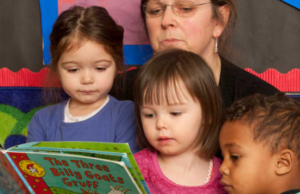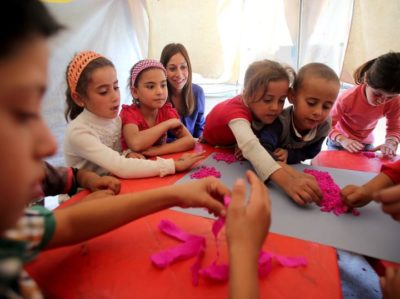By Ludovica Serratrice (Professor of Bi-Multilingualism in the School of Psychology and Clinical Language Sciences)
 All parents need to make many decisions on their children’s behalf. What they should eat, which school they will go to, whether they have access to a smartphone, and at what time they should go to bed at night, to name just a few. When there is more than one language in the family, parents also need to think about which languages they will speak to their children, which languages they would like their children to speak, and how to make it happen. Whether they are aware of it or not, multilingual parents have a Family Language Policy: beliefs and practices to manage their children’s languages.
All parents need to make many decisions on their children’s behalf. What they should eat, which school they will go to, whether they have access to a smartphone, and at what time they should go to bed at night, to name just a few. When there is more than one language in the family, parents also need to think about which languages they will speak to their children, which languages they would like their children to speak, and how to make it happen. Whether they are aware of it or not, multilingual parents have a Family Language Policy: beliefs and practices to manage their children’s languages.
Whether parents decide – more or less explicitly – to raise their children with one or more languages in addition to the language of the country they live in, depends on a complex set of beliefs and attitudes to child rearing and to the place and value of knowing and using multiple language. These attitudes and beliefs will affect parents’ decisions on whether they will try to pass on their heritage language. Placing a high value on family ties and a cultural bond with the country of origin are often beliefs that strongly motivate parents to raise multilingual children and to adopt strategies to do so.
Just as important as having a strategy is putting in place concrete plans for how to implement it. While children undoubtedly have a great language learning potential, they still need motivation and opportunities to learn more than one language. In the absence of a developmental, genetic, or neurological disorder children will learn to use one language to communicate with those around them – typically the language of the society in which they live. When the languages of the family are different from the language of the wider society, parents need to provide meaningful opportunities to hear and use those languages for children to learn them. And this is where parents need a family language policy that is realistic and appropriate to meet their family’s language goals.
Deciding what those goals are is the first step and it involves thinking about whether speaking two or more languages is essential, or whether understanding them but not actively speaking them is a more realistic goal. In many multilingual families children grow up to be receptive multilinguals who understand their parents’ heritage language but answer in their societal language, for example speaking English to a Polish-speaking parent. Being able to read and write in the family’s heritage languages may be important for some. Books are a great way to make and keep linguistic and cultural connections and so is being able to text or use other social media to keep in touch with friends and extended family. Literacy is however something that needs to be explicitly taught and this is where attendance at a complementary school could facilitate the process. In addition to resources such as books, digital media, and tuition in the heritage language, time and timing are of the essence. In today’s busy lives between work, school and extracurricular activities, parents who want to raise multilingual children also need to find time to nurture multiple languages. This is not always easy especially when only one of the parents is the heritage language speaker and may be the only source of input in that language, and it may be even harder when there are not just two but several languages in the family. The old adage that it takes a village to raise a child rings
particularly true in the case of raising multilingual children. Parents understandably feel chiefly responsible for their children’s language learning, but they can and should rely on their extended network of family and friends. Grandparents, aunts and uncles, or friends on a videochat are a great source of input, and so is watching TV or films together and commenting with children of any age. For younger children, playdates and complementary schools where they can meet peers sharing the same heritage language are excellent opportunities both for linguistic and cultural enrichment and to develop a sense of belonging.
Growing up multilingual is a dynamic process and over time children may distance themselves from their parents’ heritage languages. Even when children or teenagers stop using one of their languages not all is lost, valuing languages can manifest in many different ways as children grow into adults. Giving children agency in their own language choices is key element of a successful family language policy and one that is core to harmonious bilingual development.
Join us online on Wednesday 28th February at 6pm GMT where we will discuss all things family language planning with Dr Eowyn Crisfield author of Bilingual Families.
The event is free but booking is essential. Book your place here.


